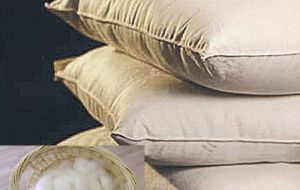MercoPress. South Atlantic News Agency
Transition to organic wool picks up in Australia, New Zealand

Australian wool broker Lanoc Wool has recently initiated a 'transition to organics' course with the help of TM Organics and a group of ten woolgrowers who collectively produce around 3000 bales per annum.
This move comes on the back of increasing retail interest in organic wool garments and in particular UK's Marks & Spencer's decision to make 650,000 organic wool garments for its spring range through Ciel Textiles in Mauritius. Although the new course has been started up within the last month, the transition period for farmers can take 3 years (or a minimum of 2) before a grower can sell produce certified as organic wool. "The group has already had an initial meeting with top maker Fletcher International, which has confirmed its commitment to organic wool, according to Don McDonald of Lanoc who noted the challenges ahead: "There are some substantial hurdles for growers to overcome to gain certification, the largest being blowfly controls especially if mulesing is banned. Animal welfare is of paramount importance and if a sound non-surgical option to mulesing is not developed then the use of chemicals to prevent fly-strike is the only option for most." TM Organics noted that the usual estimates are that Australia probably only produces about 300 tonnes of organic wool per year, about 1% of the countries production, but the organic consultancy suspects that many organic producers have sheep that could easily be brought into organic certification. "The Western Division of NSW (New South Wales) is the region most likely to convert large areas to organic wool production. There are registered organic products for lice control, so production problems are mostly concerned with prevention of and treatment for fly strike. The market could eventually grow to 10% of the wool clip." The company notes that the competition for this market comes chiefly from New Zealand and Argentina, but there are also moves in Uruguay to increase the production of organic wool in the region. "We expect the organic wool market to grow rapidly. The market is now driven not just by health concerns, but also by animal rights campaigners, increased awareness of the positive environmental benefits of organic agriculture, and by the new association of organic with fashion and media cool," said TM Organics. The issue of whether the wool industry should go down the organic certification route is being hotly debated by the wool industry. A high level meeting in Biella, Italy next month will discuss whether the organic route is right for the industry since many insiders believe wool is naturally 'organic' and does not need labelling to demonstrate its sustainable credentials.




Top Comments
Disclaimer & comment rulesCommenting for this story is now closed.
If you have a Facebook account, become a fan and comment on our Facebook Page!